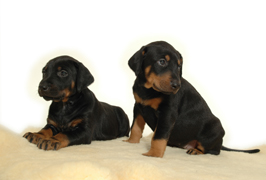Pet Care
Feeding
· Puppies need several small meals a day. Just like babies, their stomachs are small, and so they can only eat small frequent meals. Adult dogs need only one or two meals a day. Some people prefer to feed only one meal each day, but most people tend to feed ‘breakfast’ in the morning, and ‘dinner’ at night.
· Pets thrive on routine, so it’s a good idea to try and feed your dog at the same time every day.
· Do not feed your dog before you feed yourself – it can result in dominance problems. Similarly, do not feed your dogs scraps whilst you are eating – it will result in annoying begging habits. By all means, save some titbits of your meal for your pet if you wish, but place them in his own bowl, after your meal is over.
· Your dog should be given his own feeding area and he should be left alone to eat as they don’t like to be bothered during feeding. You can mark this area with a feeding mat with his food and water bowls on it. This will make it easy to clean.
· It is possible to develop a home-made diet for your pet, but home-made diets tend to high in fat and are often nutritionally unbalanced.
· There are many commercial diets available for dogs. They fall into two broad categories – wet and dry foods. Wet food simply means tinned food and dry foods are complete balanced diets.
· Wet food diets tend to be bulkier and heavier to carry home than dry foods. Dogs who eat wet foods tend to produce larger, smellier droppings than those who are fed a dry diet.
· Many owners prefer dried food as it is less messy and more convenient to feed.
· It is vital, especially when feeding dry foods, that fresh water is made available to your dog at all times.
Exercise
· As a general rule, larger breeds need more exercise than small breeds, but there are exceptions. Some small dogs, such as many terriers, require plenty of exercise, and some large dogs can be quite lazy. One would expect greyhounds to need hours of exercise, but in fact, a medium walk each day will suit their needs. Check up on your proposed breed before you buy!
Training
· Training is essential. A well-trained dog will be a happier pet and a more enjoyable companion to live with. The first, and most important training, is to house train your puppy. Thereafter, your pup should be trained to sit, to stay, to lie down, to come when called, and to walk to heel.
· House training: Take your pet outside after every meal, and as soon as he wakes after sleeping. Wait for him to urinate or defecate, and then make a big fuss of the pup and praise him. There will be accidents so be prepared – keep newspapers down on the floor. Resist the temptation to discipline the puppy after an accident – this will only slow down the learning process.
· It is best to start training early, before your puppy picks up bad behaviours.
· Teach each lesson one at a time; do not confuse the puppy by doing too much at once.
· Keep commands short and simple. Remember that dogs do not understand English!
· Train your dog on a long training lead for added control.
· Keep your voice pleasant, but firm. Adjust the tone for different commands, but remember to be consistent.
· Always praise success.
· Training should be fun – keep sessions short and enjoyable, no progress will be made if you are frustrated and your dog is tired.
· Remember that puppies have bad days too.
Healthcare
· Life expectancy varies with the breed. Giant breeds have short life spans – often only seven or eight years. Small breeds tend to live longer – sometimes up to 20 years. However, on average, 14 or 15 years would be considered average.
· Healthcare starts when you buy your puppy/dog. Check that s/he looks healthy. S/He should be alert and bright eyed, not too thin and not too fat. Once you pick your pet, take him/her to the vet on the way home, for a thorough check. Your vet will also advise you on their vaccination and worming programme.
· Vaccination:There are four major diseases which your dog should be vaccinated against – Distemper (Hardpad), Leptospirosis, Hepatitis, and Parvovirus. Dogs can also be vaccinated, via a nasal spray, against kennel cough.
· Dogs are susceptible to both roundworms and tapeworms. Puppies are especially prone to roundworms, but are unlikely to get tapeworms before 6 months of age.
Holidays
· Never go on holidays without making adequate arrangements for your pet. There are several options available.
· Kennels: There are many commercial kennels all over the country – some are good; some are not so good. Ask around. Check the establishment. Do the dogs look happy? Do the pens look clean? Are the pens large enough? Do the dogs have heat? Do the dogs get walked? Remember that not all dogs do well in a kennel situation, whereas others seem to enjoy their stay.
· Kindly neighbour: Many people ask a neighbour to pop in and feed and walk their dog. Your dog will be less stressed in his own environment, but without his family around, your pet may be very bored and lonely. Be warned that some dogs which are perfectly friendly towards a neighbour when you are around, may become very aggressive when home alone and that neighbour tries to enter the house.
· Staying with friends: If you have friends whom the dog knows well, and who enjoy his company, it can often work out that the dog is happy to go and stay with them.
Insurance
· Pet Insurance pays the veterinary costs if your pet becomes ill or is injured in an accident. Some policies will also pay out if the pet dies, is lost or stolen.
· The owner will usually pay the amount due to the Vet, and then send in the claim form and receive reimbursement, which some companies and policies limit according to their own schedule of necessary and usual charges. In the event of a very high bill, some veterinarians will allow the owner to put off payment until the insurance claim is processed. Some insurers pay veterinarians directly on behalf of customers. Not all policies cover 100% of the cost. Shop around for the best policy for your family.
· Traditionally, most pet insurance plans did not pay for preventative care (such as vaccinations) or elective procedures (such as neutering). Recently however, some companies are offering routine care coverage.
· In addition, companies often limit coverage for pre-existing medical condition. Therefore it is wise to insure very young animals who are not expected to incur high veterinary costs while they are still healthy.
· Some insurers offer options not directly related to pet health, including covering boarding costs for animals whose owners are hospitalized, or costs (such as rewards or posters) associated with retrieving lost animals. Some policies also include travel cancellation coverage if owners must remain with pets that need urgent treatment or are dying.
· Some policies for dogs also include third party liability insurance. Thus, for example, if a dog causes a car accident that damages a vehicle, the insurer will pay to rectify the damage for which the owner is responsible.








